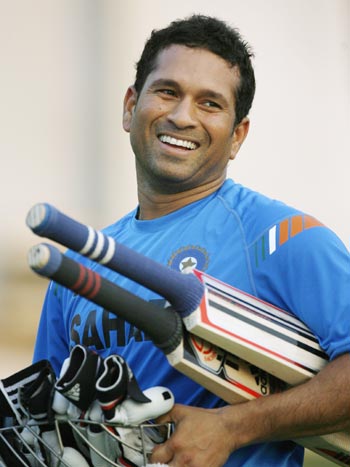 Ace cricketer Sachin Tendulkar was Thursday named a Goodwill Ambassador by the United Nations Environment Programme.
Ace cricketer Sachin Tendulkar was Thursday named a Goodwill Ambassador by the United Nations Environment Programme.
Tendulkar will use his massive global popularity to raise awareness and harness support for environmental action in his home country of India and around the world.
"I have played and enjoyed my cricket across the planet. Now, it's also time to do something for the planet, which is our only home," he said.
"Being part of the effort to save the planet is an immense undertaking but it is a challenge I am ready to undertake. Working with UNEP and cricket fans across the globe, I am in good company. Together we can do it."
The agency's executive director Achim Steiner voiced confidence that Tendulkar's "character, personal integrity, intellect and profile will catalyze widespread environmental action".
With 2010 being the UN's International Year of Biodiversity, the cricket legend will work with the agency to boost the global and grassroots response to the loss of animal and plant diversity worldwide.
Tendulkar is no stranger to the work of the UN, having lent his voice to a UN Children's Fund campaign in India on the importance of personal hygiene.
As one of his first duties as Goodwill Ambassador, he will lead a Green Pledge to save the planet when the Indian Premier League kicks off its third season Friday night in Mumbai.
The vow -- to be made in front of the millions of fans -- reads 'the Earth is our home and together we must conserve our precious wildlife, forests and oceans. I am proud to pledge that I will play my part in caring for our natural heritage.'
Along with Tendulkar, different captains will sign a giant globe made out of recycled materials.
Every day of the 45-day tournament will feature 'green' tips, on how to limit greenhouse gas emissions and care for the environment, which will be shown on giant screens in stadiums and read out by commentators.
The new UNEP-IPL partnership will also look into ways to minimize the League's carbon footprint and become more environmentally friendly, including waste management, energy efficiency, carpooling and recycling.
Steiner, the UNEP chief, said that the agency recognizes that as a rapidly developing economy, India's consumption and production patterns could define the planet's future.
"We need to make the right choices in terms of how best to manage energy and natural resources," he said. "To borrow a cricketing metaphor, these choices will define whether the world is running or soon will be run out."




